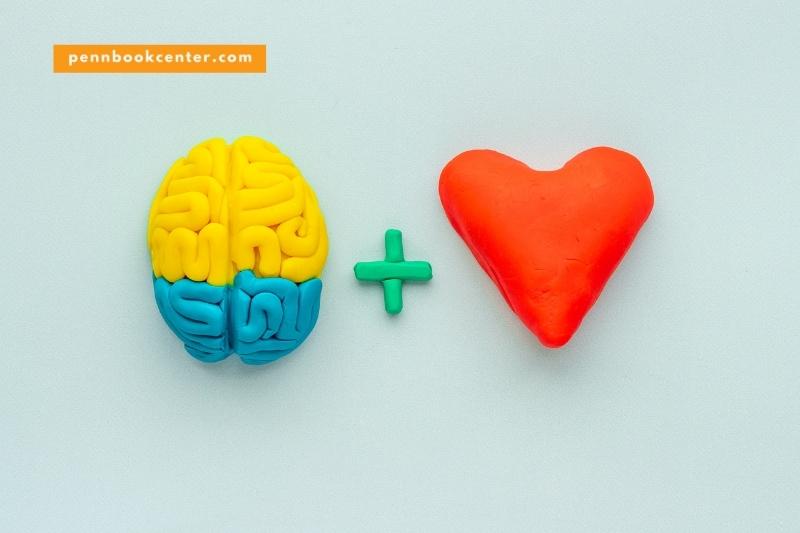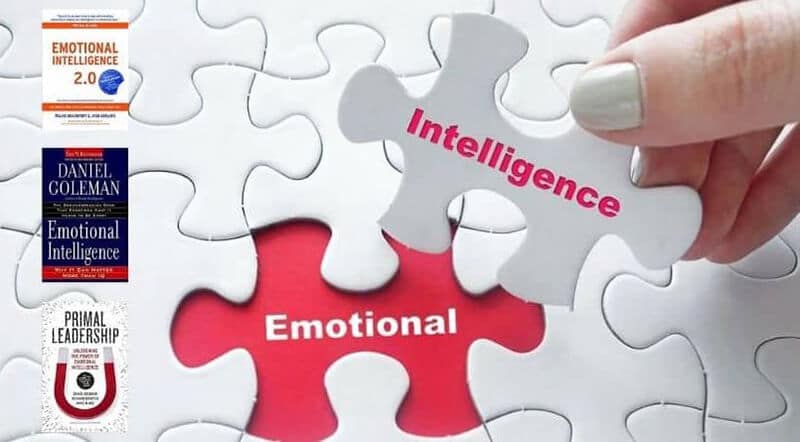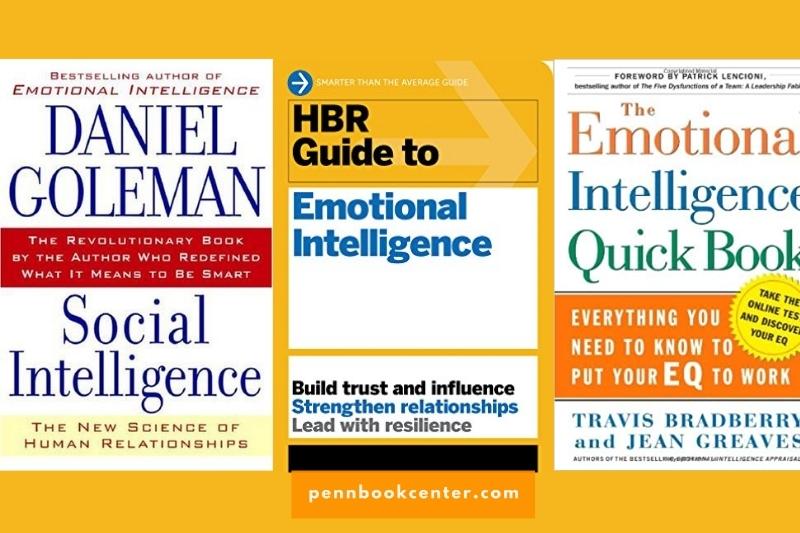what is emotional intelligence (ei)? it is the ability to understand, use and manage your emotions in invaluable and constructive ways.
Emotional intelligence plays an essential intangible role in helping us understand and manage emotions positively to relieve anxiety, communicate effectively, understand and empathize with others, address problems, overcome struggles, and defuse conflicts.
You are reading: Best books on emotional intelligence
The various applications of cognitive compassion and social intellect extend from organizational facets to family life, companionship, intimate relationships, and much more. no matter the facet, penn book put together a list of some of their best books on emotional intelligence from top academic writers and ie specialists.
what is emotional intelligence and why is it important?
understanding and controlling your emotions and those of other people is known as emotional intelligence, commonly known as emotional quotient or eq.
Like iq, emotional intelligence can also be assessed through numerous tests, although eq measures emotional intelligence rather than cognitive ability.
Although everyone can benefit from emotional intelligence, those in leadership positions need it more than others. Emotionally intelligent leaders can communicate clearly, empathize with others, and manage conflict. these skills are characteristics of good leaders.
Here are five emotional intelligence talents you need to master to enhance your leadership qualities.
how to develop emotional intelligence skills?
You can take steps to improve your emotional intelligence if your current skills are lacking. the methods consist of:
1. start a diary.
Consider your meetings, projects, and interactions from the day’s activities, both good and bad. You can identify precise patterns in your behavior and responses, as well as those of others, by writing down your ideas.
where were you the best? How are your staff members feeling? Do you ever get angry with certain people or circumstances? if so, why? the better, the more thoughtful you are. for example, you’ll become more aware of what’s irritating you so you can avoid a future tantrum or mimic behaviors that have been shown to increase staff morale.
2. complete a 360 degree assessment
In a 360-degree review, you ask your manager, co-workers, and colleagues for feedback while doing a personal self-assessment at the same time. you can learn a lot from the process about how your co-workers view your strengths and limitations and any potential blind spots you may have.
More than 85% of all Fortune 500 companies employ 360-degree feedback, according to Jack Zenger, CEO of leadership development firm Zenger Folkman. can help leaders become more self-aware, which leads to higher work productivity, less stress, and more meaningful interpersonal bonds.
3. use active listening techniques
Only 10% of people, according to current psychology, listen effectively. the use of technology, background noise and one’s own thoughts can lead to distraction. however, you must be a good listener to be an effective communicator and emotionally intelligent leader.
Practice active listening to develop emotional intelligence. pay attention to what is being said and show your interest by paraphrasing and using other nonverbal cues, such as nodding your head. connecting with people and fully understanding their ideas and emotions at work will be easier if you actively listen to them.
4. be aware of your emotions
You must first understand your own feelings to understand those of others.
make a deliberate effort to think about your emotions whenever you notice a compelling emotion, whether it’s pleasant or bad. think for a moment about the reasons behind your feelings and what could have caused such a powerful emotional reaction.
You will learn to recognize your own emotions and those of your co-workers. you will be able to develop a productive team by being an empathic leader.
5. enroll in an online training or course
Taking an online leadership course or training might be the best course of action if you’re interested in learning more about emotional intelligence and developing your leadership skills.
Working people can take self-paced online courses and interact with a global network of peers who share their interests while learning new things.
Consider harvard business school’s online leadership principles course, which offers a 360-degree assessment to help you better understand who you are as a leader and how others see you.
best emotional intelligence books you should read
emotional intelligence: why it may matter more than iq by dr. Daniel Goleman
according to psychology and neuroscience, behavioral and brain science specialist dr. Goleman explains the essential success skills provided by psychological intelligence that could influence your work and relationships and affect your overall health. His thoughts on ways to improve his emotional intelligence are certainly worth reading.
goleman’s first new york times bestseller book – ei: why it may matter more than iq available on amazon as an ebook for kindle and as an audiobook.
go suck on a lemon: strategies to improve your emotional intelligence by michael cornwall
another fantastic guide, where michael cornwall focuses on aspects of equalization such as controlling feelings, being open-minded, breaking psychological codependency, and thinking before acting.
going to suck on a lemon has a marginally no-nonsense style that seems to provide you with a process you can use when approaching any activity with much more cautious and thoughtful psychological problem solving.
The central theme of the book’s title is a lemon with a bitter taste, but the natural lemon is your own bitter inner dialogue. even if you’re not aware of negative self talk i appreciate one from dr. the cornish methods: internal dialogue.
Most people talk to themselves to address particular difficulties and queries or to prepare for presentations. however, it is an internal dialogue in each of these scenarios.
See Also: The Best Franz Kafka Books – Five Books Expert Recommendations
what the internal dialogue says is crucial. does it help your progress? keep you confined? look at the effects of your actions in the physical world to find out!
bitter self-talk most often occurs in an unconscious way, not a conscious one. Anyone who wants to listen to their inner dialogue and learn from it should read this book. Are you being held back by negative self-talk?
emotional intelligence 2.0 by drs travis bradberry and jean greaves, and patrick m. lencioni
If you’ve heard of EI, you’ve probably heard of Emotional Intelligence 2.0, which is one of the best-known books on managing your emotions.
Among the most famous on this topic, this book by Drs. Travis Bradberry and Jean Greaves, and Patrick M is more about using EQ to improve your life.
You’ll find a step-by-step program to increase your EI that focuses on four core skills: Self-Awareness, Self-Management, Social Awareness, and Relationship Management, along with activities that can enable you to boost all of these regions.
the eq difference: a powerful plan to put emotional intelligence to work by adele b. lynn
This particular book deals directly with using your eq at work (as the title says). Through helpful exercise examples and exercises, it shows the profound impact your emotions can have on your own life at work, from operation to relationships with co-workers. this is achieved through comfortable (and functional) changes in his ideas and actions.
applied eq: the real-world guide to emotional intelligence
Writer justin bariso, a newcomer to the equalization scene, joins a compelling scientific investigation using high-profile working examples and engaging personal stories. If he has ever questioned the use of EQ concepts as soon as he learned them, then this book is for you. bariso provides plenty of up-to-date, real-world advice on how to best use eq in recognizable everyday scenarios and in the heat of the moment.
i found the twelve commandments fascinating. the first six are as follows:
- You must reflect on my feelings;
- You must learn from the perspectives of others;
- You must learn to pause;
- You must practice empathy;
- you should praise others;
- you should apologize.
the eq difference: a powerful plan to put emotional intelligence to work by adele b. lynn
on the internet you will find a lot of information about ei. but many of these articles are derived from subjective conditions that will help you understand the idea of mental well-being but will not allow you to achieve it. That is why it is essential to find a more complex publication that guides you in the particular actions of your personal development.
adele b. Lynn offers powerful advice for professionals of all levels. His illustrations and practical advice help readers understand the ramifications that different emotions have on our values, relationships, and work performance.
As soon as you learn to recognize these effects, you will have the ability to achieve more significant career achievements.
the eq edge: emotional intelligence and its success by steven j. Stein and Howard E. book
This publication can quickly become your long-term companion. highly developed wisdom and imagination are genuinely necessary for successful operation on multiple levels, but the function of emotional intelligence is at least as vital.
the eq edge educates us eq has a fundamental meaning when people try to advance in the office, strengthen their effective relationships, improve their confidence and become leaders.
The book also contains a practical guide that allows us to improve relationships with other people but also together.
building emotional intelligence by linda lantieri
If you’re a parent, it’s essential to help your children develop the basics of EQ from an early age. the most important part of children’s development is not studying, science or math. Instead, it is the potential Linda Lantieri defines as inner strength. The approach elaborated in this publication may also be useful for adults who are considering fostering their emotional intelligence.
With the step-by-step manual, the writer empowers people to improve their mindfulness and awareness, increase self-esteem and compassion, and improve their successful communication skills.
the 7 habits of highly effective people by stephen r. flock
not necessarily mentioned in precisely the same breath as others in regards to raising your eq; however, there is a reason this book continues to be a bestseller to millions of people around the world. taking a less traditional approach to the subject, it doesn’t focus on emotional intelligence like others with this list are. instead, it presents a guide for anyone seeking to understand and control their feelings.
The seven habits outlined in his novel call for awareness and management of emotional intelligence by instructing people on how to become more proactive, think about the big picture, and manage diverse interactions while building more efficient communication.
working with emotional intelligence by daniel goleman
This is packed with intriguing case studies of successes, tragedies, and dramatic turnarounds from over 500 companies around the world. this may be your most significant endeavor.
Daniel Goleman’s second post examines how the EQ competencies investigated in his first story can be implemented in the workplace. ironically, it is again heavily focused on the business world and provides useful tools for groups, supervisors, leaders and the business itself.
this book contains stories and scripts of ei, including directors, directors and supervisors. In addition, it also addresses a number of main concepts related to EI, in particular the connection between anxiety, impulse control and hormones.
emotional intelligence for the modern leader by christopher d. connors
Daniel Goleman’s book provides you with the foundation and academic facet of emotional intelligence. This book teaches you how to use EQ to your advantage and gives you the resources to make it happen. This post has exercises, quizzes, and tools to help you understand and use EI.
examples of leaders whose loved ones and some lower names provide context for the ways ei is used in business and in life. In addition, there are many personal development tools in the text that you use, which can help you get to know yourself.
Take a quick look at our 22 Best Anger Management Books of All Time, 2022 Review, here to learn how to solve the cycle of anger and irritation issues
jeanne segal’s language of emotional intelligence
This post is on everyone’s lists and for good reason. is an excellent source for locating information on using ei to build superior connections with just about everyone in your life.
segal presents a simple step-by-step program on the best way to use five main resources of emotional intelligence to improve your relationships through better communication, studying non-verbal cues and acquiring skills to diffuse disagreements and conflicts before they get out of hand.
leadership: the power of emotional intelligence by daniel goleman
the best in ie and leadership
This publication contains Daniel Goleman’s most acclaimed work on leadership, IE, and organizational performance. this post includes over twenty years of goleman articles.
- Leadership That Gets Results This article focuses on the six core leadership styles and their related competencies, as well as the flexibility to apply these skills.
- what makes a leader? effective leader? an article on how better leaders use self-awareness and self-management to show empathy in everyday behavior;
- managing with heart is a book that looks at collective intelligence discharge, performance and their relationship. what is the link to ei? a high collective iq and a high eq are the same thing.
- the social brain gives you a good description of the neural side of interpersonal interactions.
- the sweet spot for achievement: goleman discusses stress and optimal performance and how they are related according to the yerkes-dodson law. This book offers guidance for leaders who want to ensure the best “fit” for their employees’ skills and motivation.
Time management is also the top priority skill we need to keep in mind in this modern life, check out our 26 Best Time Management Books To Read [2022] to go punch holes in the form or laser cannons of construction to manage your problems.
the emotionally intelligent manager: how to develop and use the four key emotional skills of leadership by david r. caruso, peter salovey
the emotionally intelligent manager is a book that will allow you to read the works of an influential ei researcher. Peter Salovey of Yale University has received numerous awards for his extensive research on EI.
See Also: Maya Banks – Book Series In Order
Developed the Mayer Salovey Caruso Emotional Intelligence Test (MSceit) to measure EI.
the emotionally intelligent manager explores the many ways organizational leaders can use the four capabilities of salovey & Mayer’s concept of emotional intelligence (1990).
- feeling emotions;
- facilitating emotion-based thinking
- understanding emotions is key to understanding them.
- how to manage emotions
This book provides many practical ways to develop ei. It starts with an understanding of how these capabilities are used in everyday organizational life.
Primal Leadership: Unleashing the Power of Emotional Intelligence
This book was first published in 2001. It focuses more on leadership development. the authors’ work focuses on “leadership styles” and may be more applicable to those managing teams or businesses.
goleman, annie mckee, and richard boyatzis draw on their consulting experience to identify the six styles and present them. each type may be different for different situations. they are:
- visionary
- affiliation
- democratic
- training
- ruling is a skill
- mark the rhythm
This book may have some information that will interest readers who are interested in learning more about EI. the first leadership also analyzes academic research. The authors use the research findings to explain how EI, or self-awareness and empathy, may be related to certain leadership behaviors.
However, it’s not overly academic and most people find it a short read. boyatzis introduces the reader to his theory of self-directed learning (boyatzis 1999) to empower leaders to grow and develop professionally.
For those of you with leadership experience, it can be a great way to expand your knowledge of EI and build on the essential skills you already have. primal leadership offers practical guidance on how to build emotionally intelligent organizations.
how to win friends and influence people by dale carnegie
before asking, “why doesn’t this book have an emotional intelligence title?” I already know it. because it is the part of emotional intelligence that can be used. you are using emotional intelligence by applying the fundamental concepts.
This book was first published in 1936 to help readers reduce anxiety by following the three C’s. do not complain, do not condemn and do not criticize. Dale Carnegie also made use of a variety of other concepts, such as the Golden Rule Book.
a small gold-colored booklet that fits in your pocket and highlights essential guidelines for everyday life. Since 1936, the beliefs of Dale Carnegie have been taught and practiced on a daily basis. I am a Dale Carnegie graduate and a living example of their values.
I created my own life coaching practice, “Discover Your Four Core Values,” with the support of these simple principles. can you provide your four core values? this work is still relevant today and worth reading.
the power of belief in business by ari weinzweig
This book examines how personal beliefs influence business vision, since our beliefs determine our feelings, moods and emotions. In 1982, Ari co-founded the Zingerman business community with a very distinctive business strategy that has stood the test of time.
Here’s how it works: Although fifteen companies use the Zingerman brand, each is owned by a different managing partner. these partners exchange goods with each other and with the local community.
I worked with Ari separately while interning at the bakery, run by Managing Partners Amy Emberling and Frank Carollo. The beliefs of various company owners, including Ari’s, are contained in this book.
Whether you’re an entrepreneur or want to understand other people’s opinions, this is a must read.
emotional development and emotional intelligence: educational implications by peter salovey and david sluyter
despite having a foreword by dr. Goleman, this book focuses on children’s emotional intelligence and how to nurture it. the main goal is to educate children on the use of emotional intelligence at home and in social situations.
First they determined the stressor and developed a plan to manage it. A stressor is anything that causes stress in the environment, and a strategy is how to deal with the stressor.
distraction and redirection to the work at hand were two things we focused on when I worked with children on the autism spectrum disorder scale. it was a scenario that was mostly under control with few distractions or tensions.
This book will provide you with invaluable insights into raising emotionally intelligent children if you have or want to have children.
change: how to change things when the change is difficult due to chip and dan heath
dan and chip are believed to manipulate reality to separate the logical and emotional halves of the brain. the rational mind takes its time to consider information, gather evidence, and then come to a conclusion. the emotional brain, however, is impulsive and quick to act. as a result, the emotional brain is reactive, while the rational brain is responsive.
Because our ideas and emotions work to control each other, I tend to agree with the two-brain theory. they work in harmony or conflict, like yin and yang.
the emotional part of the mind urges, “go ahead, overeat which is a little weight gain”. still, argues the logical side, “if you overeat, you could gain weight.”
Finding a mutually acceptable compromise between the rational and emotional brains is the secret to maintaining balance. This conflict has probably come up for all of us at some point. Read this book if you want to improve brain harmony and agreement.
handbook of social and emotional learning: research and practice by joseph a. Durlak, Celene E. Domitrovich, Roger P. Weissberg and Thomas P. gullet
This book appeals to me because it looks at teaching children social skills using various social learning theories. As you may remember, social learning has two parts. both social awareness and social regulation include understanding how to deal with other people’s emotions.
One theory may be targeted to a specific population, while another may help find effective implementation tactics. for example, the first theory picks out a particular group, in this example an age group that would benefit most. the second theory measures child outcomes to determine how well the program is working.
The central theme of the book is how to foster social-emotional learning (sel) in elementary students. is a must read if you want to develop your social skills and discover new facts about improving ego in schools.
more best books on emotional intelligence:
-
social intelligence by daniel goleman
corrie by alice munro (a story in the new yorker, 2010)
uncle rock by dagoberto gilb (another New York story from 2010).
Emotional Intelligence: A 21-Day Step-by-Step Guide to Mastering Social Skills, Improving Your Relationships, and Raising Your EQ (Best Emotional Intelligence Audiobooks)
hbr guide to emotional intelligence (harvard business review 2017)
the emotional intelligence quick book by jean greaves and travis bradberry
emotional agility: breaking away, embracing change, and thriving at work and in life by susan david
conclusion
Whether you’re looking for the best books on improving emotional intelligence to get an overview of the topic or you’re more curious about how emotional intelligence can be implemented in the office, there’s plenty of literature available. Hopefully you found something in this article that piqued your curiosity!
Have you read any of those novels we’ve covered? you like them? Alternatively, do you have any book suggestions that people can include? We’re eager to hear your feedback, so feel free to discuss your ideas with us in the comments.



